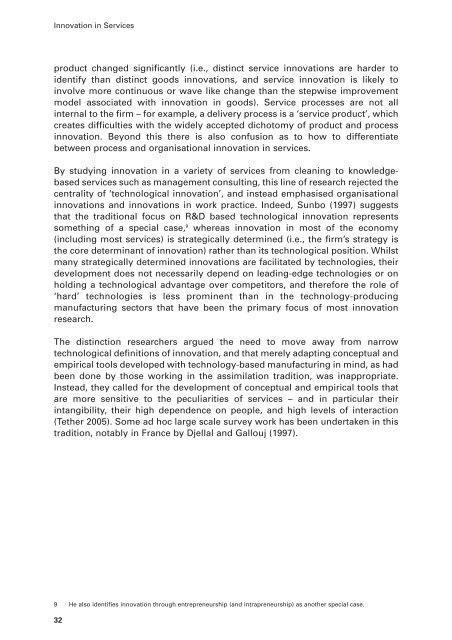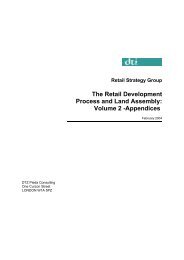Innovation in Services - Department for Business, Innovation and Skills
Innovation in Services - Department for Business, Innovation and Skills
Innovation in Services - Department for Business, Innovation and Skills
Create successful ePaper yourself
Turn your PDF publications into a flip-book with our unique Google optimized e-Paper software.
<strong>Innovation</strong> <strong>in</strong> <strong>Services</strong><br />
product changed significantly (i.e., dist<strong>in</strong>ct service <strong>in</strong>novations are harder to<br />
identify than dist<strong>in</strong>ct goods <strong>in</strong>novations, <strong>and</strong> service <strong>in</strong>novation is likely to<br />
<strong>in</strong>volve more cont<strong>in</strong>uous or wave like change than the stepwise improvement<br />
model associated with <strong>in</strong>novation <strong>in</strong> goods). Service processes are not all<br />
<strong>in</strong>ternal to the firm – <strong>for</strong> example, a delivery process is a ‘service product’, which<br />
creates difficulties with the widely accepted dichotomy of product <strong>and</strong> process<br />
<strong>in</strong>novation. Beyond this there is also confusion as to how to differentiate<br />
between process <strong>and</strong> organisational <strong>in</strong>novation <strong>in</strong> services.<br />
By study<strong>in</strong>g <strong>in</strong>novation <strong>in</strong> a variety of services from clean<strong>in</strong>g to knowledgebased<br />
services such as management consult<strong>in</strong>g, this l<strong>in</strong>e of research rejected the<br />
centrality of ‘technological <strong>in</strong>novation’, <strong>and</strong> <strong>in</strong>stead emphasised organisational<br />
<strong>in</strong>novations <strong>and</strong> <strong>in</strong>novations <strong>in</strong> work practice. Indeed, Sunbo (1997) suggests<br />
that the traditional focus on R&D based technological <strong>in</strong>novation represents<br />
someth<strong>in</strong>g of a special case, 9 whereas <strong>in</strong>novation <strong>in</strong> most of the economy<br />
(<strong>in</strong>clud<strong>in</strong>g most services) is strategically determ<strong>in</strong>ed (i.e., the firm’s strategy is<br />
the core determ<strong>in</strong>ant of <strong>in</strong>novation) rather than its technological position. Whilst<br />
many strategically determ<strong>in</strong>ed <strong>in</strong>novations are facilitated by technologies, their<br />
development does not necessarily depend on lead<strong>in</strong>g-edge technologies or on<br />
hold<strong>in</strong>g a technological advantage over competitors, <strong>and</strong> there<strong>for</strong>e the role of<br />
‘hard’ technologies is less prom<strong>in</strong>ent than <strong>in</strong> the technology-produc<strong>in</strong>g<br />
manufactur<strong>in</strong>g sectors that have been the primary focus of most <strong>in</strong>novation<br />
research.<br />
The dist<strong>in</strong>ction researchers argued the need to move away from narrow<br />
technological def<strong>in</strong>itions of <strong>in</strong>novation, <strong>and</strong> that merely adapt<strong>in</strong>g conceptual <strong>and</strong><br />
empirical tools developed with technology-based manufactur<strong>in</strong>g <strong>in</strong> m<strong>in</strong>d, as had<br />
been done by those work<strong>in</strong>g <strong>in</strong> the assimilation tradition, was <strong>in</strong>appropriate.<br />
Instead, they called <strong>for</strong> the development of conceptual <strong>and</strong> empirical tools that<br />
are more sensitive to the peculiarities of services – <strong>and</strong> <strong>in</strong> particular their<br />
<strong>in</strong>tangibility, their high dependence on people, <strong>and</strong> high levels of <strong>in</strong>teraction<br />
(Tether 2005). Some ad hoc large scale survey work has been undertaken <strong>in</strong> this<br />
tradition, notably <strong>in</strong> France by Djellal <strong>and</strong> Gallouj (1997).<br />
9 He also identifies <strong>in</strong>novation through entrepreneurship (<strong>and</strong> <strong>in</strong>trapreneurship) as another special case.<br />
32
















